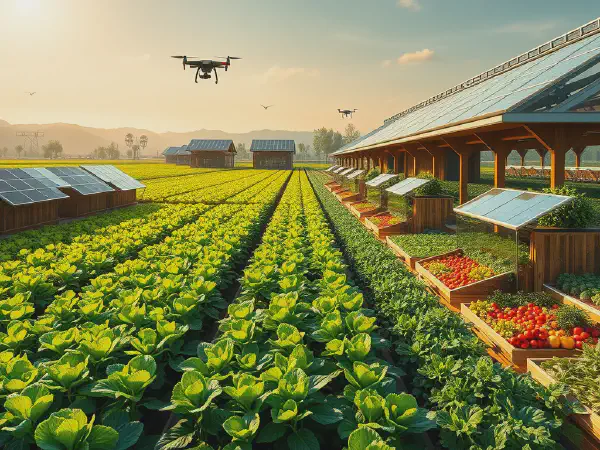Explore Innovations Shaping the Future of Agriculture

Innovations in Agriculture: Shaping the Future of Food Production
Innovations in Agriculture have become a focal point for ensuring food security and sustainability in a rapidly changing world. As the global population continues to grow, the agricultural sector is under immense pressure to produce sufficient food while combating climate change, soil degradation, and resource scarcity. By leveraging technology and adopting modern practices, the agriculture industry aims to enhance productivity and sustainability.
Investing in sustainable practices is crucial for fostering long-term growth and resilience in the field of Agricultural Innovation.
One major area of focus within Innovations in Agriculture is Precision Agriculture, which utilizes advanced technologies such as GPS, IoT, and data analytics to optimize farming practices. This approach allows farmers to make data-driven decisions that can lead to increased efficiency and reduced waste. With tools like drones for crop monitoring and soil health monitoring systems, farmers can assess their land’s condition and make informed adjustments that improve yield and sustainability.
Sustainable Farming Practices form another critical aspect of Innovations in Agriculture. As the negative impacts of conventional farming become more apparent, methods like regenerative agriculture, vertical farming, and water conservation techniques are gaining traction. These practices not only help in maintaining environmental balance but also promote the long-term viability of agricultural ecosystems. By focusing on sustainability, farmers are finding ways to produce healthy crops while safeguarding natural resources.
The realm of Genetic Engineering and Biotechnology also plays a pivotal role in transforming agricultural practices. With advancements like CRISPR technology, farmers can enhance crop traits such as yield, pest resistance, and climate resilience. Furthermore, the development of biopesticides and biofertilizers provides eco-friendly alternatives to traditional chemical inputs, encouraging healthier ecosystems and sustainable farming practices.
AgriTech Startups have emerged as key players in driving Innovations in Agriculture. These startups are revolutionizing the agricultural space by developing innovative farming apps, platforms that connect farmers with consumers, and providing investment opportunities that enhance agricultural technology. Numerous successful AgriTech companies have shown how leveraging technology can lead to significant improvements in agricultural efficiency and profitability.
Precision Agriculture
Drones for crop monitoring have become increasingly popular in Precision Agriculture. Farmers can now use drones equipped with cameras and sensors to monitor crop health from the air, enabling them to detect issues like pest infestations, nutrient deficiencies, or water stress much earlier than traditional methods allow.
Soil health monitoring with IoT sensors is another significant advancement in this area. By placing sensors in fields, farmers can access real-time data on soil moisture, temperature, and nutrient levels. This information empowers them to make timely decisions regarding irrigation, fertilization, and other critical management practices.
Data analytics for yield optimization is transforming how farmers approach production. By analyzing historical data and current trends, farmers can develop predictive models that help them understand the best practices to maximize their yields while minimizing resource inputs.
Sustainable Farming Practices
Regenerative agriculture techniques focus on restoring soil health and increasing biodiversity through practices like crop rotation, cover cropping, and minimal tillage. These methods not only improve the resilience of farm ecosystems but also enhance carbon sequestration, contributing to climate change mitigation.
Vertical farming solutions allow crops to be grown in stacked layers, often utilizing controlled environment agriculture (CEA) techniques. This method significantly reduces the footprint of farming and minimizes the use of water and land while maximizing yield in urban settings.
Water conservation practices, including rainwater harvesting and drip irrigation, are becoming essential in sustainable agriculture. These techniques help farmers optimize their water usage, ensuring that crops receive the necessary hydration while preserving invaluable water resources.
Genetic Engineering and Biotechnology
CRISPR technology is revolutionizing crop enhancement by allowing scientists to modify genes with remarkable precision. This cutting-edge approach holds the potential to create crop varieties that are higher-yielding, more nutritious, and better able to withstand environmental stressors.
Biopesticides and biofertilizers are innovative solutions derived from natural materials. These products help farmers manage pests and diseases without relying on harmful chemicals, promoting safer and more sustainable agricultural practices.
Crop resilience through genetic modifications is crucial as climate change continues to impact agricultural productivity. By developing crops that can withstand drought, flooding, and extreme temperatures, genetic engineering is striving to ensure food security in an uncertain future.
AgriTech Startups
Innovative farming apps and platforms developed by AgriTech startups provide farmers with tools to improve their operations. From farm management software to marketplaces that connect farmers directly with consumers, these technologies enhance efficiency and transparency in the agricultural supply chain.
Investment trends in agricultural technology indicate a growing recognition of the importance of innovation in this sector. Venture capitalists are increasingly funding AgriTech startups that focus on solving real-world problems in agriculture, leading to a surge in technological advancements and new solutions.
Case studies of successful AgriTech companies illustrate the potential of technology in agriculture. From seed-to-sale tracking systems to smart farming solutions that allow farmers to monitor their crops remotely, these companies are proving how innovation can drive progress within the industry.
Smart Irrigation Systems
Automated irrigation control systems enable farmers to manage their irrigation more efficiently by utilizing soil moisture data and weather forecasts. This system ensures that crops receive just the right amount of water, reducing waste and promoting sustainable practices.
Water usage optimization technologies, such as moisture sensors and smart drip irrigation systems, help farmers minimize water consumption while maintaining crop health. These innovations contribute significantly to water conservation efforts in agricultural production.
Case studies of smart irrigation implementations demonstrate the effectiveness of these advanced technologies. Farms that have adopted smart irrigation systems often report increased crop yields and reduced water costs, showcasing the benefits of integrating technology into traditional farming methods.
